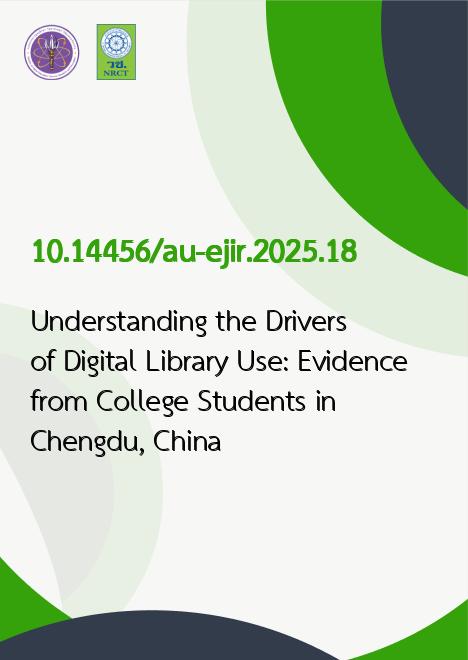
|
Understanding the Drivers of Digital Library Use: Evidence from College Students in Chengdu, China |
|---|---|
| รหัสดีโอไอ | |
| Creator | Youqi Wen |
| Title | Understanding the Drivers of Digital Library Use: Evidence from College Students in Chengdu, China |
| Publisher | Assumption University Press |
| Publication Year | 2568 |
| Journal Title | Journal of Interdisciplinary Research |
| Journal Vol. | 10 |
| Journal No. | 2 |
| Page no. | 21-32 |
| Keyword | Digital Library, Attitude, Behavioral Intention |
| URL Website | https://assumptionjournal.au.edu/index.php/eJIR/article/view/9055 |
| Website title | JIR |
| ISSN | 2408-1906 |
| Abstract | Purpose: This study aims to explore the factors influencing students' attitudes and behavioral intentions toward using digital libraries in universities and colleges in Sichuan Province, China. Research design, data and methodology: This study employs quantitative methods and structured questionnaires to collect sample data. Before distributing the questionnaire, the alignment between the research objectives and survey items will be assessed, and a small-scale pre-test will be conducted to ensure content validity and reliability. Subsequently, two statistical techniques, confirmatory factor analysis and structural equation modeling—will be applied to analyze the collected data. This process will assess the model’s fit and clarify causal relationships between variables, providing a solid foundation for hypothesis testing. Results: The conceptual framework has been shown to effectively predict college students' behavioral intentions (BI) regarding digital library usage. Notably, Effort Expectancy (EE) and Social Influence (SI) are the most influential factors driving this intention. Conclusions: EE emerges as the most reliable predictor of business intelligence (BI) in the context of digital library usage. Additionally, IT was found to indirectly influence BI by shaping UA. Based on these insights, the study suggests that by leveraging advanced information technology solutions, providing high-quality services, and ensuring strict information security, digital libraries can more effectively meet users' needs, thereby promoting wider adoption and supporting the sustainable development of higher education. |